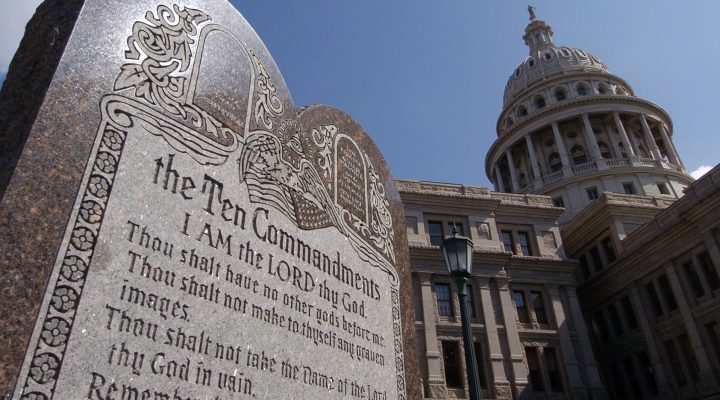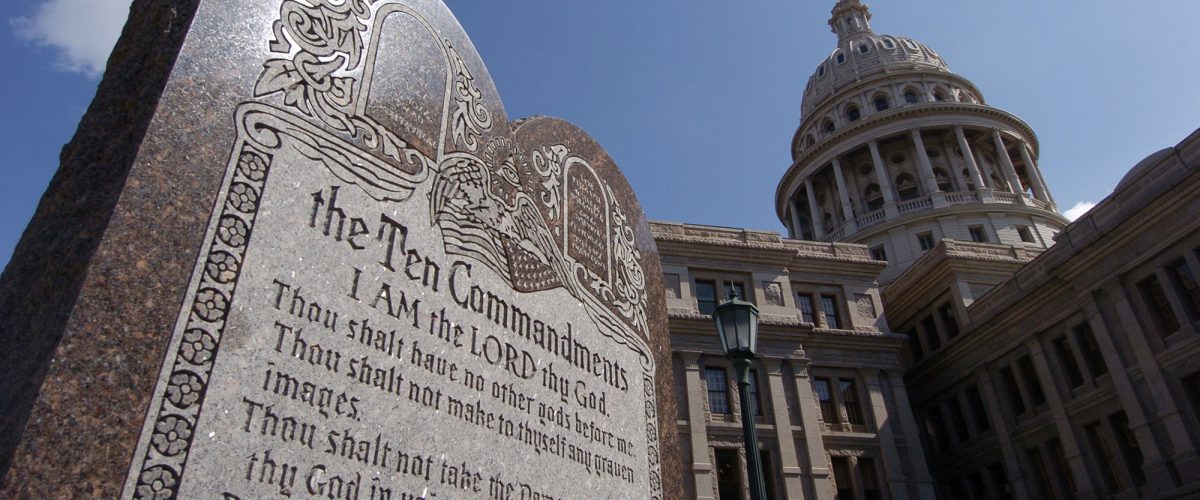A controversial effort to require posting the Ten Commandments in all Texas public school classrooms has died for this session.
Senate Bill 1515 passed through the Texas Senate on party-line votes but was among dozens of bills that didn’t get a vote in the House before the midnight deadline May 23. The Texas Legislature meets every other year for a defined period of time, creating hard deadlines for passage of bills.
Critics of the bill — including clergy and church-state separationists — called it a blatant example of Christian nationalism and unconstitutional. Advocates for the bill were emboldened by the U.S. Supreme Court’s 2022 decision in Kennedy vs. Bremerton, a case about a high school assistant football coach who wanted to pray on the 50-yard line after games.
The Biden administration contends that high court ruling has been misunderstood and does not grant license to religious favoritism in public schools. Posting the Ten Commandments would favor Christianity over all other religions, critics of the bill have noted.
“Stopping Texas from forcing public school classrooms to display the Ten Commandments is a victory for religious freedom,” said Amanda Tyler, executive director of Baptist Joint Committee for Religious Liberty.
“Stopping Texas from forcing public school classrooms to display the Ten Commandments is a victory for religious freedom.”
She and Holly Hollman, BJC general counsel, recently devoted an episode of their weekly podcast to the Ten Commandments question.
Hollman called the bill “a particularly bad idea and brazen attempt by a legislature to push forward a religious agenda as soon as they had a crack in the (U.S. Supreme) Court’s Establishment Clause jurisprudence.”
The bill would have required Ten Commandments display that are at least 16 inches wide and 20 inches tall and “in a size and typeface that is legible to a person with average vision from anywhere in the classroom.” The bill also would have dictated specific English wording of the commandments, which originally were recorded in Jewish Scriptures in Hebrew.
The Texas Tribune reported: “Democrats in both chambers had fiercely opposed the idea, saying it would be an insult to non-Christian Texans and an attempt to erode the separation of church and state. The legislation was the latest in an ongoing push by conservative Christians to center public life around their religious views. This session, lawmakers have called church-state separation a ‘false doctrine’ as they push legislation that has concerned non-Christian groups, including a bill to allow unlicensed religious chaplains to work in Texas schools.”
Texas has become Ground Zero for national efforts to enact policies that favor conservative evangelical beliefs in public schools and state government. This has included organized efforts to take control of local school boards and to elect state officials who share their beliefs.
The Texas Legislature did pass a bill allowing public schools to hire unlicensed “chaplains” instead of licensed school counselors. An effort to create a state-funded voucher program for private Christian schools was thought to be dead in this session but recently was revived as an amendment to a different bill in the final days of the session. That bill is still pending.
Related articles:
Texas Ten Commandments bill is a bad idea, Tyler and Hollman warn
‘Thou shalt not covet thy neighbor’s wife’ and other posters I do not want in a first grade classroom | Opinion by Britt Luby
New platform of Texas GOP is laced with Christian privilege


